Most of us cook in some form or fashion, even if it’s just boiling water for pasta. But what does it mean to be a professional cook?
Put simply: a professional cook is someone who prepares and cooks food for a living. They may work in a restaurant or café. They may work as caterers or in-house at a banquet hall. They could work in a food truck or assist a personal chef.
But a professional cook is not necessarily a chef. Find out the distinction between the two, and how you could start cooking professionally.
The Difference Between a Professional Cook and a Chef
“Chef” is not simply another word for “professional cook.” While both cooks and chefs work with food, “chef” is a specific title that must be earned. A chef is usually a supervisory role, responsible for menu and recipe development, the profitability of the kitchen, and managing the kitchen team. A cook, on the other hand, is responsible for executing the chef’s recipes and following their instructions.
Does this mean that you’re a professional cook on your first day in a restaurant kitchen? Well, there’s no hard-and-fast rule on exactly when you transition from “cook” to “professional cook.” Maybe it’s when you become comfortable with the menu and with your station in the kitchen. Or maybe it’s after you’ve moved up from entry-level into a more advanced cooking role.
Some cooks really thrive and become experts in their part of the kitchen. While some professional cooks hope to become chefs, some prefer the lower-stress job of being a cook. Not everyone wants to be the boss!
“The truth of the matter is that you ought to be more proud of being a great cook than a mediocre chef.”*
Jesper Jonsson, Escoffier Chef Instructor and Board Member, American Culinary Federation
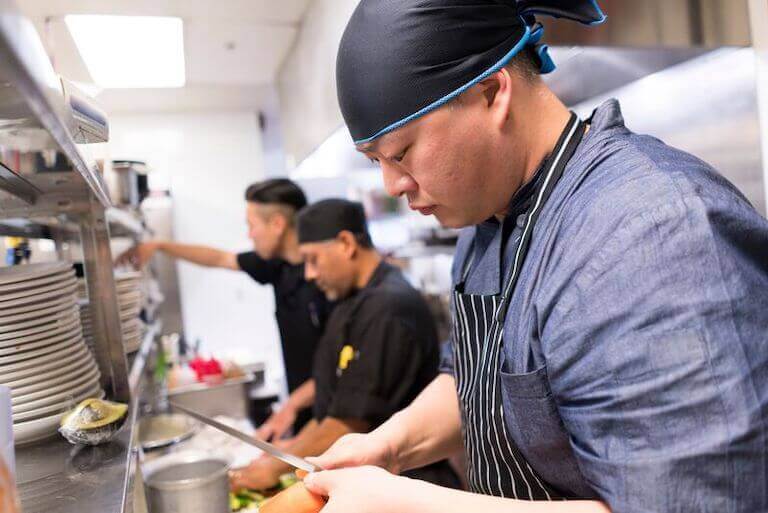
How to Start Cooking Professionally
If the life of the professional cook is calling to you, you may want to follow these steps to get started on this fulfilling career.
1. Start Researching the Options
Cooks have tons of options! You could aim for cooking in the top echelons of kitchens, with your sights on Michelin-starred restaurants like Ever in Chicago or Knife & Spoon in Orlando. Perhaps there’s a type of cuisine that you’re passionate about, like French haute cuisine or the art of perfect sushi.
Or maybe it’s not the restaurant, but the chef that excites you. Maybe you aim to work for a successful chef like Curtis Duffy or a rising star like Mashama Bailey.
You don’t have to have it all figured out, but having an idea of where you’d like to spend your time as a professional cook can help you to create a roadmap.
2. Get Your Culinary Education
Wherever you get hired, there may be be on-the-job training to bring you up to speed on the recipes and techniques you’ll have to execute.
But you’ll probably be expected to bring some level of expertise with you as well. To work as a cook, you’ll need to know…how to cook! And this is where culinary school can be invaluable.
Escoffier’s culinary arts programs can prepare the future professional cook with the tools they may use every day on the job. Students could learn the vital knife skills and various cuts that they may be asked to perform. They could develop mise en place proficiency, ensuring they keep their workstations clean and organized. Basic cooking methods, important sanitation principles, baking and patisserie—an Escoffier graduate may bring all of these skills to the job. So they may require less training than another entry-level employee who didn’t attend culinary school.
Beyond the cooking, students may also develop business skills in cost control and waste prevention. Even though the professional cook isn’t usually in charge of these types of metrics, this knowledge could make the cook an even greater asset to their chef.
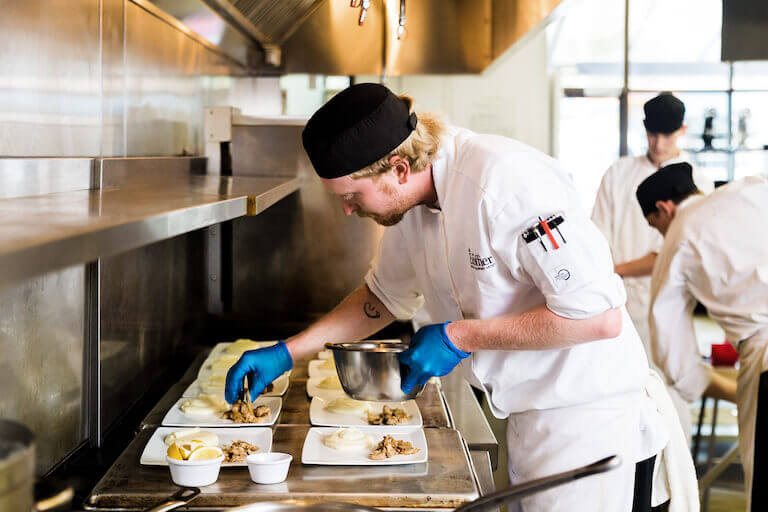
3. Complete an Externship
If it’s your first time cooking professionally, you may not know what to expect when you tie on your apron and head to the kitchen. A culinary externship can help bridge the gap between what you’ve learned in school and the realities of the professional world.
At Escoffier, all students complete either one or two in-person industry externships, giving them the opportunity to put their feet to the fire and see what a working kitchen is really like. This experience may be a valuable part of the learning experience, letting new cooks grow accustomed to the speed and energy of a restaurant environment before they get their first official jobs as culinary school grads.
Some externships have even led to full-time job opportunities for graduates! So we encourage students to pick their externships based on their passions or a specific area they are wanting to explore.
“All the puzzle pieces are starting to come together because of the real-world experience that I now have [due to my externship], which I didn’t have before.”*
Mike Harden, Escoffier Online Culinary Arts Graduate
4. Start Working, Keep Learning
After culinary school at Escoffier, students can be ready for their first entry-level jobs in the industry. This may be a prep cook position, which could include pre-portioning proteins, chopping and blanching produce, and pre-cooking items like sauces or soups.
Prep cook work is highly valuable and crucial to a restaurant’s success. But it’s not usually what people envision when they think of the professional cook. They often think of a line cook, working a specific station during service like the grill, sauté, or garde-manger.
The good news is that with a culinary degree or diploma and some hard work, you may be able to progress from a prep cook position to a line cook position fairly quickly.* Of course, this depends on the individual employee and the employer! But a prep cook who is eager to learn and willing to take direction can set themselves up for that promotion.*
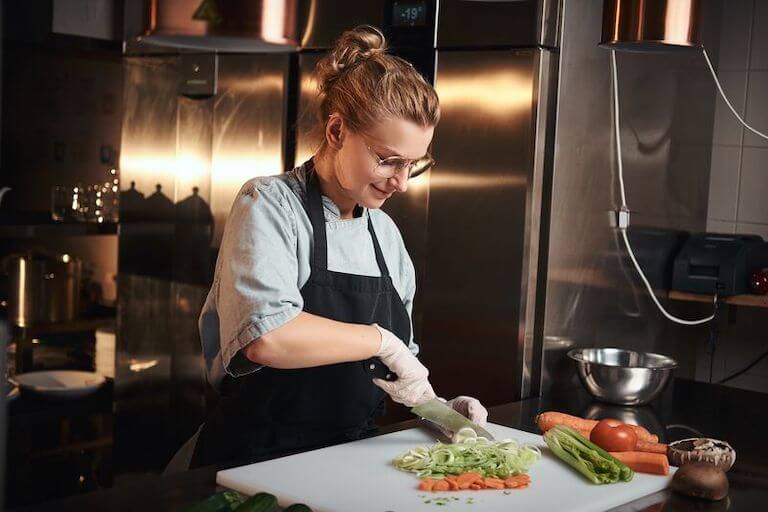
5. Earn Additional Certifications
Once you become a professional cook, what’s next?
There’s always more to learn. Many cooks choose to get additional training and certifications that make them better cooks and prove their dedication to their craft.
The American Culinary Federation is a highly respected industry association that offers certifications for cooks and chefs. The Certified Culinarian® designation is the highest level of certification for cooks, with additional levels available for sous chefs, chefs de cuisine, and executive chefs.
Should You Consider a Career as a Professional Cook?
Professional cooking isn’t for everyone! Ask yourself these questions to determine if you’d thrive in this career.
Do You Have a Passion for Great Food?
Cooking day in and day out requires a passion for the craft. Great cooking comes from the heart. You will likely be creating many of the same menu items over and over, so it’s helpful if you can find the joy and pride in sharing that one special dish with each and every person who orders it.
From the ingredient prep to the cooking process to the clean-up afterward, every part of a cook’s job must be done with care to achieve wonderful results, and that takes passion.
“My joy and my passion…the reason I started cooking professionally was that I really wanted to connect with other people….Food is your connector to everyone. Food is something that means something very deep and meaningful to each of us in very different ways.”*
Stephanie Michalak-White, Escoffier Lead Chef Instructor and Certified Cicerone®
Do You Thrive on Teamwork?
One of the best parts of being a cook is the camaraderie that comes with the role. From the dishwasher to the executive chef, everyone in the kitchen is pulling together to get through service and provide the best possible food for their guests.
The people are often cited as one of the best parts of working in a kitchen. There are no cubicles, no private work areas—you’ll be face-to-face with your colleagues for your entire shift. So you must be willing to fully integrate into the team, in order to pull your own weight and help your coworkers to feel supported.
“Teamwork is dream work, and you need to have one eye and one ear on everyone else in the space at all times.”*
Steve Konopelski, Escoffier Chef Instructor and Winner, Food Network’s Haunted Gingerbread Showdown
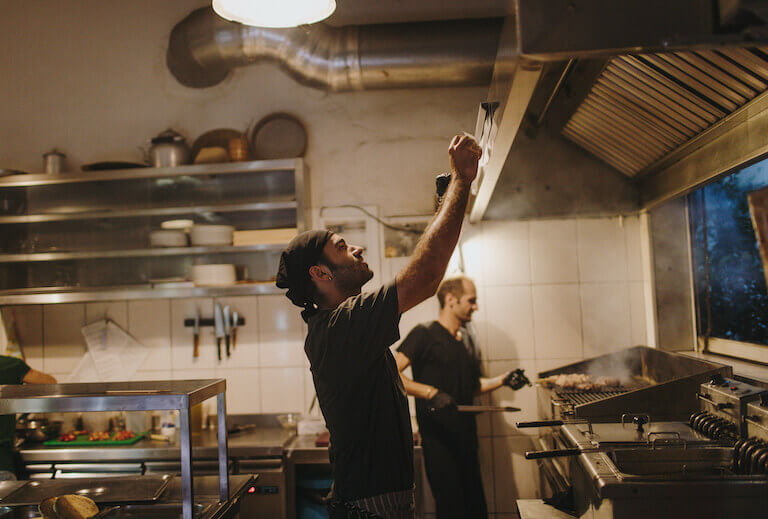
Do You Take Direction Well?
A professional cook creates the chef’s vision through their recipes. There may be times when you think your way is better. But as a cook, it’s your duty to take the feedback that you’re given, and integrate it into your work.
If you’re the type who bristles at correction from the boss, then a career as a professional cook may prove challenging. Remember, no one knows everything—and you may end up finding a better way to do something, even if you doubt it at first.
Will You Take Ownership of Your Station or Responsibilities?
While cooks do not usually make high-level decisions, they do make many small decisions daily, which can help or hurt the restaurant’s bottom line. A great cook will take ownership of what they can, rather than adding extra stress for the chef.
For example, a cook who takes pride in keeping their station clean both increases their efficiency and may help reduce waste. A clean, organized station makes spills (and therefore wasted product) less likely, which reduces further cleaning time and lowers food costs.
Cooks who “own” their contributions can be a huge asset to the overall operation and can be invaluable to a busy chef.
It’s an Exciting Time to Be a Professional Cook!
We live in the era of the entrepreneur. Escoffier Chef Instructor Colette Christian estimates that 70-75% of her baking and pastry students want to start their own businesses. That’s wonderful!
But it also means that the need for trained, dedicated professional cooks is going to be higher than ever. All those new businesses will need employees. And strong cooks can be the backbone that holds those businesses together.
With a online culinary school education, you could start your career with a solid foundation and may become a valued part of the kitchen team. Get all the details about studying Culinary Arts at Escoffier, including tuition and financial aid and how to apply!
To learn more about careers in the culinary arts, try these articles next:
- What It Takes to Be An Executive Chef
- Are the Culinary Arts a Good Career Choice For You?
- Different Types of Jobs in the Brigade de Cuisine
*Information may not reflect every student’s experience. Results and outcomes may be based on several factors, such as geographical region or previous experience.

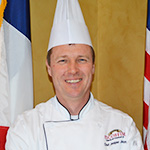 “The truth of the matter is that you ought to be more proud of being a great cook than a mediocre chef.”*
“The truth of the matter is that you ought to be more proud of being a great cook than a mediocre chef.”*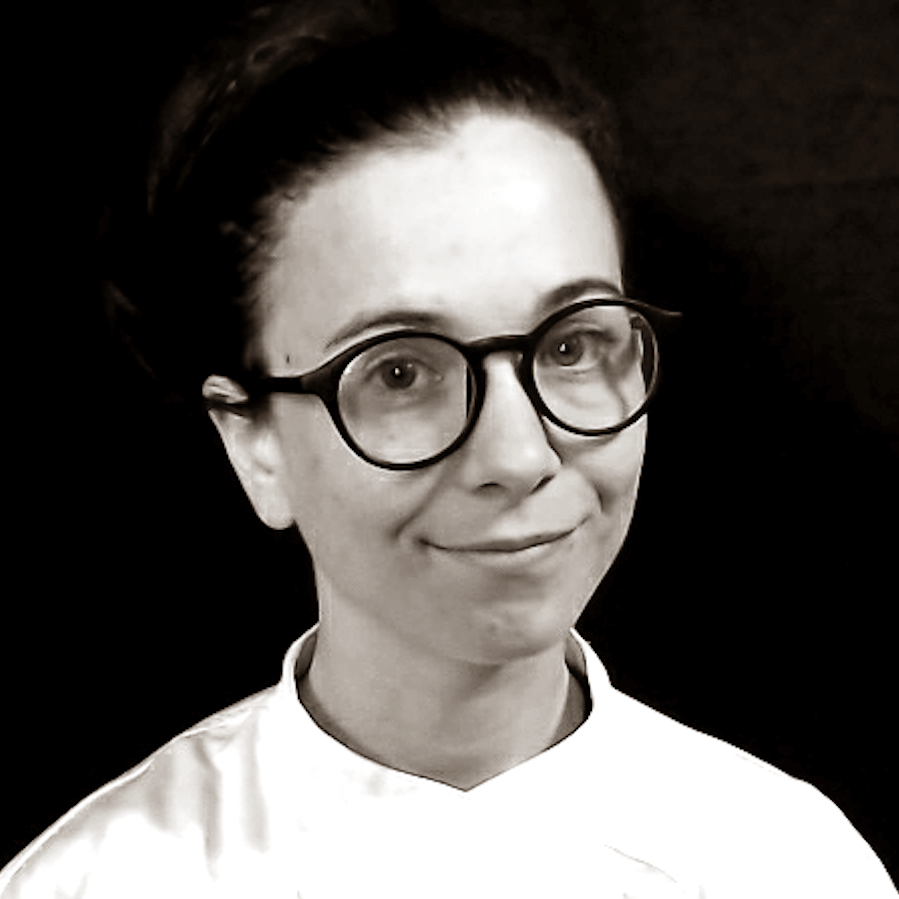 “My joy and my passion…the reason I started cooking professionally was that I really wanted to connect with other people….Food is your connector to everyone. Food is something that means something very deep and meaningful to each of us in very different ways.”*
“My joy and my passion…the reason I started cooking professionally was that I really wanted to connect with other people….Food is your connector to everyone. Food is something that means something very deep and meaningful to each of us in very different ways.”*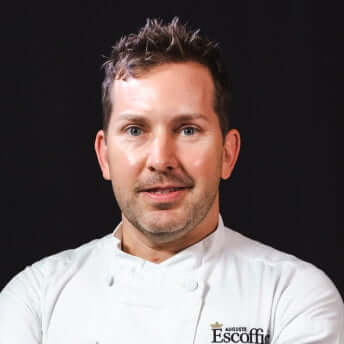 “Teamwork is dream work, and you need to have one eye and one ear on everyone else in the space at all times.”*
“Teamwork is dream work, and you need to have one eye and one ear on everyone else in the space at all times.”*